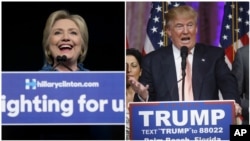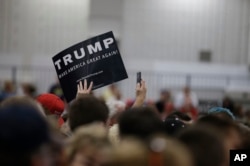Democratic lawmakers have told VOA they are now assuming a presidential contest pitting Hillary Clinton against Donald Trump, while some Republicans still cling to hopes their party will nominate someone other than the New York businessman.
The assessments came one day after Trump swept five primary contests and former secretary of state Clinton won four. Both front-runners dramatically expanded their respective delegate leads, although they did not clinch their party’s presidential nomination.
“I think it’s pretty clear that it’s going to be Donald Trump against Hillary Clinton,” said Democratic Senator Ed Markey.
“The results for Secretary Clinton were so strong that it is very plain she will be our nominee,” said another Democrat, Tim Kaine.
“On the Republican side, the five-for-five [Trump victories] makes it more likely that Mr. Trump will be over the threshold when he goes to [the Republican National Convention in] Cleveland, or he will have such a lead that it would be very difficult for him to be thwarted,” Kaine added.
Among Republican lawmakers, perspectives differ as more primary contests loom.
“If you want to stop Trump, we’d better win Indiana, and [challenger Ted] Cruz and [challenger John] Kasich better coordinate their strategy regarding California,” said Republican Senator Lindsey Graham. “We have to be all hands on deck when it comes to the remaining primaries. If we can stop him [Trump] in Indiana, we’ve got a chance.”
Republicans opposed to Trump are banking on a contested convention in which the businessman fails to win the nomination outright, and delegates coalesce around an alternative after a first round of balloting.
Graham says such an outcome is not without precedent.
“With [former president] Abraham Lincoln, we [Republicans] picked the guy that finished second, not the guy that finished first," Graham said. "So if it was good enough for Abe, then it would be good enough for [Ted] Cruz, or whoever we pick second.”
In 1860, it took three rounds of balloting for Republicans to nominate Lincoln, then a relatively obscure congressman, over a prominent senator, William Seward.
Another Republican, Senator John McCain, said he has no idea how his party’s presidential nomination will play out.
“I don’t know. I’ve been wrong on every prediction so far; I don’t know why I would get one right,” said McCain, who was the Republican presidential nominee in 2008.
McCain has repeatedly pledged to support his party’s eventual nominee; but he expressed doubts about the ability of Republicans to unite behind Trump.
“I’ve heard people who say they could never vote for him [Trump],” McCain said. "I don’t know if they will change their mind or not."
Democrats could also face unity hurdles if backers of Clinton’s challenger, Vermont Senator Bernie Sanders, fail to rally behind the Democratic banner.
Senator Kaine, who backed Barack Obama in 2008 and supports Clinton now, says Sanders has a vital role to play.
“There’s no reason to think that Bernie shouldn’t continue to campaign, but I hope we’ll see a tonal change where he is trying to help bring everybody together to do what has to be done: win in November,” Kaine said.
“I know him [Sanders]. I know what he wants to happen in November if he’s not the nominee. He would view Trump as a real existential threat to the values he cares deeply about,” Kaine added. “He’s going to be very motivated to have the right outcome [a Democratic victory], and his rhetoric over the next months can help make that happen.”
While the prospect of a Trump nomination elicits cheers from only a handful of Republican lawmakers, Democrat Markey says he is looking forward to a Clinton-Trump presidential contest.
“I feel very good about that match-up. I think Hillary Clinton is going to be a decisive favorite,” Markey said.













